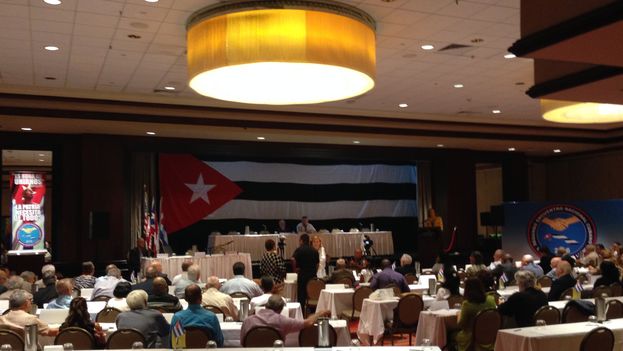
![]() 14ymedio, Reinaldo Escobar, San Juan, 15 August 2016 — The emergence of a new opposition partnership called the Conference of the Cuban National Congress is the most notable result of the event that has gathered in Puerto Rico 65 organizations from the island and in exile.
14ymedio, Reinaldo Escobar, San Juan, 15 August 2016 — The emergence of a new opposition partnership called the Conference of the Cuban National Congress is the most notable result of the event that has gathered in Puerto Rico 65 organizations from the island and in exile.
After lengthy and complex discussions in which there was laughter and tears, reasoned arguments and passionate declarations, lights and shadows… in short, Cubans. An agreement has been reached to forge an integrated structure with a Coordination Committee composed of 22 elected representatives.
Work has been assigned on different fronts distributed among 11 working committees, including ones assigned IT and communications, the press, popular consultation, Human Rights and one to address political prisoners and their families. Like any other organization, some working committees will deal with international relations, finance and legal affairs. Leading each committee is one representative from the island and one from exile. These coordinators will appoint a minimum of three and a maximum of five members to their respective committees, and will provide a report on their work every three months.
The principal declaration from the event that expresses the consensus on the new Cuba proposed at the Second Cuban National Conference, ratified the Democracy Agreement of 1988 as containing the elements needed to reconstruct the new Republic of Cuba, which had been ratified in the previous conference held in August of 2015.
The Declaration supports “the establishment of a commission against impunity” and, in response to the demands of several organizations, it proposes to “retroactively audit the management of existing companies in Cuba with the intention of respecting the conventions of the International Labor Organization.” Similarly, with clear perspective on the future, it proposes the need to implement “measures that guarantee transparency and integrity and fight corruption in public management and the electoral process of the new Republic of Cuba.”
Telecommunications was a topic at the meeting. In the accords, the US government was asked to seek an accord with the Cuban government to connect an internet cable between the two countries and to ask the American company Google to establish an appropriate policy to provide uncensored internet via wifi. In addition, it denounced the violation of the internet giant’s code of conduct for its indifference to the Cuban people in this regard.
Telecommunications were present at the meeting. In the agreements, the US government to seek an agreement with Cuba to connect an Internet cable between the two countries and the US company Google to establish a correct policy to provide uncensored internet via wifi was claimed was requested. In addition, the violation of the code of conduct Internet giant was denounced for its indifference to the Cuban people in this regard.
As is usual in this type of meeting opposition activists and civil society residents on the island manage to get together with Cuban exiles there were immeasurable parallel results that over the long term will open new contacts and support the emergence of diverse indicatives.
The results of the agreements reached will not have an immediate effect, but progress has been made, despite the inevitable differences among personalities, given those who only understand unity when it goes their way, along with all the pessimism and the overcoming of exhaustion and induced suspicions.
The composition of the Coordinating Council of the Congress of the Cuban National Conference is (in alphabetical order by last name).
Composition of the Coordinating Board of the Cuban National Congress (In alphabetical order by last name).
Chosen by the Island
Eliecer Ávila: Somos+
Henry Constantín: Proyecto La Hora de Cuba
Guillermo Fariñas: Foro Anti Totalitario Unido (Fantu)
Jorge Luis García Pérez (Antúnez): Frente de Resistencia Orlando Zapata
René Gómez Manzano: Corriente Agramontista de Abogados Independientes
Juan Carlos González Leyva: Consejo de Relatores de Derechos Humanos
Iván Hernández Carrillo: Confederación de Trabajadores Independientes de Cuba
Mario Félix Lleonart: Instituto Patmos
Damaris Moya Portieles: Coalición Central Opositora
Félix Navarro: Partido por la Democracia Pedro Luis Boitel
Rolando Rodríguez Lobaina: Alianza Democrática Oriental
Chosen by the Exile
Ana Carbonell:Instituto de la Rosa Blanca
Pedro Fuentes: Consejo Presidio Político Cubano
René Hernández: Partido Demócrata Cristiano de Cuba
Faisel Iglesias: Fundación Nuevo Pensamiento Cubano
Augusto Monge: Free Cuba Foundation
Rosa María Payá: Fundación para la Democracia Panamericana
Pedro M. Peñaranda: Círculo Democrático Municipalista
Mario Rivadulla: Unión de trabajadores cubanos de la comunicación social y la cultura.
Ramón Saúl Sánchez: Movimiento Democracia
Julio M. Schiling: Patria de Martí
Guillermo Toledo: Cubanos Unidos de Puerto Rico
